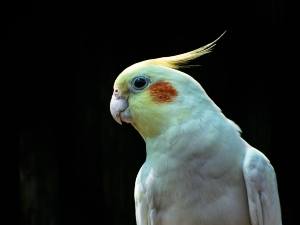
Sleeping is essential for good health. It keeps us refreshed, improves brain function, mood, and overall health.
If your bird is not eating and sleeping you may be worried. This article looks into why this happens.
Table of Contents
Cockatiel not eating and sleeping:
Cockatiels can express very interesting behaviors, behaviors that you may not have seen or noticed in your other pets.
One behavior that may concern you is the bird not eating and sleeping. Here is why this happens:
If the bird is eating less and sleeping more:
The bird is sick:
A healthy cockatiel will be full of energy and will eat to its heart’s content, but a sick cockatiel will do the opposite.
If your bird is sick then it will develop a loss of appetite and will become sleepy.
This change in behavior happens because the bird’s body is using all of its energy to get the bird better.
This redirection of energy means that digestion slows down and because of this, the bird will lose its appetite. The bird will also become lethargic and will sleep more.
What to do:
Birds will try their best to avoid showing signs of being sick.
If the bird’s behavior changes for the worst, and it starts to show signs of being ill, then this means that the illness is far along.
You may be able to diagnose your bird at home if the bird starts showing other symptoms, but it is recommended that you rather take your bird to the vet, or better yet, to an avian vet.
The vet will examine your cockatiel, diagnose your bird, and offer treatment if treatment is available
The bird is molting:
All birds molt and if your bird isn’t eating and is sleeping more than it is used to then the bird may be molting.
Molting is quite a big event for your bird and thus its behavior, with regard to its eating and sleeping, will change as well
Your bird’s behavior will change drastically when it is molting, other signs of a bird who is molting, or a bird who is about to molt, include aggressive behavior, sudden biting, new roots growing at the bird’s face or head, and scratching because its feathers are irritating it.
What to do:
Molting is quite a normal and natural process so you don’t have to be concerned if your bird is going through this.
Molting can be quite difficult for the bird and while you can’t help the bird molt you can help make the situation more comfortable for your bird.
Do this by misting the bird’s feathers with water to soothe the irritation on the bird it skin.
You can also give your bird supplements to make sure that your bird maintains good health as it molts.
In addition, give your bird toys to play with to divert their attention from the skin irritation.
If the bird is eating less and sleeping less:
The bird is stressed:
One of the reasons why your cockatiel is not eating and not sleeping may be that the bird is stressed.
If you’ve just bought your cockatiel then the bird may become stressed because it is in a new environment or because it has a new owner.
These birds can easily be stressed if they find themselves in a new environment.
They become stressed because they now have to find new food sources and new places of safety.
Because the bird is stressed it will not eat, a stressed bird will also not sleep because it fears possible threats.
What to do:
This is common and is not something to worry about. Your bird will get used to you and its new environment soon enough.
In the meantime feed your cockatiel treats to get it to warm up to you.
You can also hang around the bird, at a distance at first, to show it that you aren’t there to harm it.
If you enjoyed this article then you may also be interested in other bird related articles. Here are some articles that you may be interested in: Why Is My Budgie Always Tired?, My Budgie Just Sits There, Chicken Throwing Up Green Liquid, Why Is My Chicken Gulping?, Baby Cockatiel Not Eating Formula, How To Know If Your Baby Cockatiel Is Hungry, Can You Overfeed A Baby Cockatiel?

